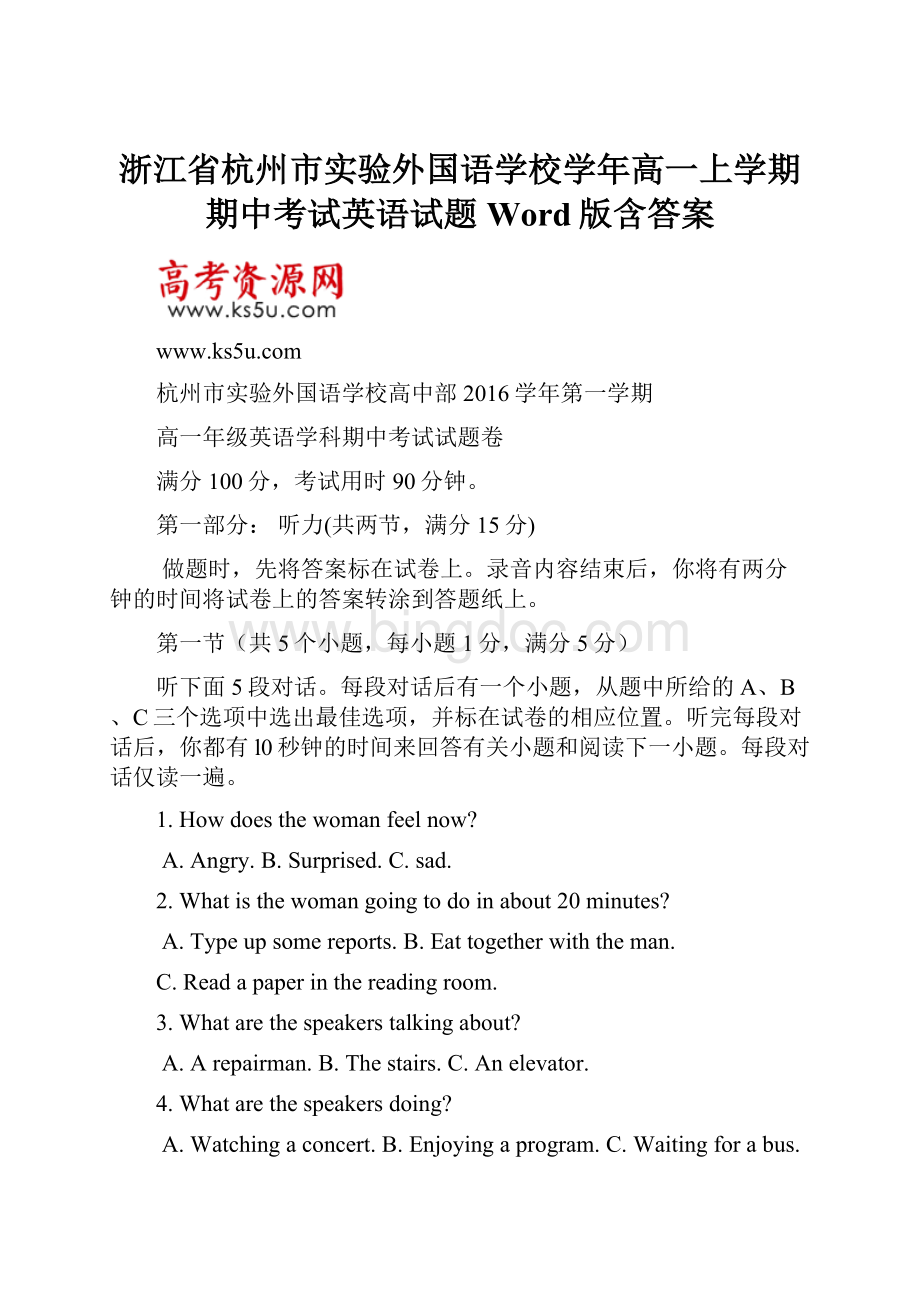浙江省杭州市实验外国语学校学年高一上学期期中考试英语试题 Word版含答案Word下载.docx
《浙江省杭州市实验外国语学校学年高一上学期期中考试英语试题 Word版含答案Word下载.docx》由会员分享,可在线阅读,更多相关《浙江省杭州市实验外国语学校学年高一上学期期中考试英语试题 Word版含答案Word下载.docx(14页珍藏版)》请在冰点文库上搜索。

A.Typeupsomereports.B.Eattogetherwiththeman.
C.Readapaperinthereadingroom.
3.Whatarethespeakerstalkingabout?
A.Arepairman.B.Thestairs.C.Anelevator.
4.Whatarethespeakersdoing?
A.Watchingaconcert.B.Enjoyingaprogram.C.Waitingforabus.
5.WhatdoesMichaeldoeveryFridayevening?
A.Hedoesaparttimejob.B.Helooksafterhischildren.
C.Heattendsaschoolactivity.
第二节(共10个小题,每小题1分,满分10分)
听下面3段对话或独白。
每段对话或独白后有几个小题,从题中所给的A、B、C三个选项中选出最佳选项,并标在试卷的相应位置。
听每段对话或独白前,你将有5秒钟的时间阅读各个小题;
听完后,各小题将给出5秒钟的作答时间。
每段对话或独白读两遍。
听第6段材料,回答第6至8题。
6.Whydoesthewomandouni-cycling(独轮车)?
A.Shewantstochallengeherself.B.Sheintendstowinacompetition.
C.Shewasinfluencedbysomeunicyclists.
7.Wheredoesthewomanoftendouni-cycling?
A.Inthepark.
B.Inthestreet.C.Inthetownsquare.
8.Whatdoesthewomanenjoymostaboutuni-cycling?
A.Itbringsherhonour.B.Itgiveshermuchfun.C.Ithelpsherkeephealthy.
听第7段材料,回答第9至11题。
9.Whatwasthelandlikewhentheman’sfatherboughtit?
A.Ithadbeenopenedup.B.Therewerefewanimalsonit.
C.Thereweremanynativeanimalsonit.
10.Whendidthelandhaveagreatchange?
A.Whenthemanwas14.B.Whenthemanwas10.C.Whenthemanwas7.
11.Whatdidpeoplebelievecausedtheproblemthen?
A.Theland.B.Thefarmersandminers.C.Theanimals.
听第8段材料,回答第12至15题。
12.Whatisthemainpurposeofthistalk?
A.Toexplaintheimportanceofthecomputer.
B.Toadvertiseacomputerlearningschool.
C.Todescribehowtoprogramcomputers.
13.Whoaremostoftheintendedlisteners?
A.Peopleoutofwork.B.Doctorsandlawyers.
C.Peopleunsatisfiedwiththeirpresentjob.
14.Whatisoneoftheadvantagesofcomputerprogrammers?
A.Theycanworkingoodconditions.B.Theycanreceivegoodtraining.
C.Theycanwinpeople’srespect.
15.Whatisthemostattractivetothelistenersprobably?
A.Meetingwell-paidpeople.B.Offeringjobopportunities.
C.Protectingtheirbelongings
第二部分:
阅读理解(共两节,满分30分)
第一节(共10个小题;
每小题2分,满分20分)
阅读下列短文,从每题所给的A、B、C和D四个选项中,选出最佳选项,并在答题纸上将该项涂黑。
A
SometimeagoIdiscoveredthatoneofmychairshadabrokenleg.Ididn'
tthinktherewouldbeanydifficultyingettingitmended,asthereareawholelotofantique(古董)shopsnearmyhome.SoIleft
homeonemorningcarryingthechairwithme.Iwentintothefirstshopexpectingafriendlyreception.I
wasquitewrong.Themanwouldn'
tevenlookatmychair.
Thesecondshop,thoughslightlymorepolite,wasjustthesame,andthethirdandthefourth-soI
decidedthatmyapproachmustbewrong.Ienteredthefifthshopwithaplaninmymind.Iplacedthe
chaironthefloorandsaidtotheshopkeeper,"
Wouldyouliketobuyachair?
"
"
Twentypounds,"
I
said."
OK,"
hesaid."
I'
llgiveyou
twentypounds."
It'
sgotaslightlybrokenleg,"
Isaid."
Yes,Isawthat.
snothing."
EverythingwasgoingaccordingtotheplanandIwasgettingexcited."
Whatwillyoudowithit?
Iasked."
Oh,itwillbeeasytoselloncetherepairisdone."
llbuyit,"
Whatdoyoumean?
You'
vejustsoldittome,"
Yes,IknowbutI'
vechangedmymind.Iamsorry.I'
llgiveyou
twenty-sevenpoundsforit."
Youmustbecrazy,"
hesaid.Then,suddenlythepennydropped."
Iknowwhatyouwant.
Youwantmetorepairyourchair."
reright,"
AndwhatwouldyouhavedoneifIhadwalkedinandsaid,'
Wouldyoumendthischairforme?
'
Iwouldn'
thaveagreedtodoit,"
Wedo
n'
tdorepairs,notenough
moneyinitandtoomuchtrouble.ButI'
llmendthisforyou.Shallwesayforafiver?
Hewasavery
nicemanandwasgreatlyamusedbythewholething.
16.Wecanlearnfromthetextthatinthefirstshopthewriter________.
A.wasratherimpoliteB.waswarmlyreceived
C.askedtheshopkeepertobuyhischairD.askedtheshopkeepertorepairhischair
17.Theexpression"
thepennydropped"
inthelastparagraphmeanstheshopkeeper________.
A.changedhismindB.acceptedtheoffer
C.sawthewriter'
spurposeD.decidedtohelpthewriter
18.Fromthepassage,wecanlearnthatthewriterwas__.
A.honest
B.carefulC.cleverD.funny
B
Assummercomesnear,manychildrenarereallyhappytofo
rgetaboutschoolforafewmonths.However,theymightbetakingthatgoaltooseriously.Studieshavefoundthatchildrenoftenforgetbetweenoneandthreemonths’worthofschoollearningduringthesummermonths.Spellingandmathabilitiesdropoffthemost,
whilereadingisnotreallyinfluenced(受影响)bythetimeoff.Themainreasonforthisisbecausemostchildrensometimesreadoutsideoftheclassroom,whethernewspapers,magazines,books,orvideogameguides.However,theirmathandspellingskillsonlygetexercisedintheschoolsetting.
Thefirstpurposeofsummerholidayswastoletfarmchildrenhavetimeofftohelpworkinthefieldsduringthegrowingseason,butthisreasonisnolongeragoodonesincefewerkidsactuallyworkonfarmstoday.SomecitiesintheUnitedStates,suchasLosAngeles,havemovedtoayear-roundschooltimetable,whichmayhelpreducethelossofschoolskillsthathappensduringthelongsummerholiday.Toimproveskillsandtokeepagoodlevelofpreparation,headmasterssuggesttripstomuseums,summercamps,holidayswitheducationalvalue,andvisitstolibrariestokeepkidsinterestedthroughou
tthesummer.
Thereareothereducationalsystemsthatprovideholidayswhilestillkeepingstudents’skillsuptodate.Forexample,inJapan,studentsattendclassforsevenweeksinarow,followedbytwoweeksofholiday.Thiscontinuesthewholeyear.InItaly,studentsattendclasssixdaysperweek,butfinishat1:
30pmeachday,sothatschooldoesnotruntheirlifethewaythatitdoesinAmerica,wherestudentsattendhighschoolfrom7:
45amuntil3:
00pmeachweekday.Inareaswheretherearenotenoughclassrooms—inAfghanistanorSomalia,forexample—olderstudentsattendclassesinthemorningwhiletheyoungerkidsgotoschoolintheafternoon.
Headmastersfearthatthethree-monthsummerholidaystopstheflowoflearning.Justasstudentsbecomeusedtonewmathproblemsornewideasinreading,writing,orthinkingskills,they“shutdown”duringthesummerholiday.Whentheygobacktoschoolafterthelongsummerholiday,theytakeuptotwomonthstoreturntotheirprevious(先前的)levelofskill.Sothedebatecontinues:
whethertocontinueholidaysortomakechangesbasedontheLosAngelesortheJapanesemodels.
19.Whichskillssufferthemostoverthesummerholidays?
A.Mathandreading.B.Mathandspelling.
C.Readingandwriting.D.Readingandthinking.
20.Whatcanwelearnaboutthefirstpurposeofsummerholidays?
A.Itisstillwidelyacceptablenow.B.Itwaspopularinsomecities.
C.Itisnotagoodreasonforcitykids.D.Itwasmoreforteachersthanforstudents.
21.Theunderlinedphrase“shutdown”inthelastparagraphprobablymeans__________.
A.stoplearningB.getsick
C.goonreadingD.focusonstudies
22.Whatcanweinferfromthepassage?
A.Parentsalwaysreadtotheirkidstokeepreadingskills.
B.Summerholidaysleadtothelossofalltheschoolskills.
C.Studentsloveholidaysandgettheirmindofflearninginholidays.
D.InItalystudentsattendclassesinthelateafternoonsixdaysaweek.
C
AsmoreandmorepeoplespeakthegloballanguagesofEnglish,Chinese,Spanish,andArabic,otherlanguagesarerapidlydisappearing.Infact,halfofthe6,000-7,000languagesspokenaroundtheworldtodaywilllikelydieoutbythenextcentury,accordingtotheUnitedNationsEducational,ScientificandCulturalOrganization(UNESCO).
Inanefforttopreventlanguageloss,scholars(学者)fromanumberoforganizations—UNESCOandNationalGeographicamongthem—haveformanyyearsbeendocumenting(记载)dyinglanguagesandtheculturestheyreflect.
MarkTurin,ascientistattheMacmillanCentreYaleUniversity,whospecializesin(专门研究)thelanguagesandoraltraditionsoftheHimalayas,isfollowinginthattradition.Hisrecentlypublishedbook,AGrammarofThangmi(唐米语)withanEthnolinguistic(语言学的)IntroductiontotheSpeakersandTheirCulture,growsoutofhisexperienceliving,working,andraisingafamilyinavillageinNepal(尼泊尔).
DocumentingtheThangmilanguageandcultureisjustastartingpointforTurin,whoseekstoincludeotherlanguagesandoraltraditionsacrosstheHimalayanreachesofIndia,Nepal,Bhutan,andChina.Butheisnotcontent(满足)tosimplyrecordthesevoicesbeforetheydisappearwithoutrecord.
AttheUniversityofCambridgeTurindiscoveredawealthofimportantmaterials—includingphotographs,films,taperecordings,andfieldnotes—whichhadremainedunstudiedandwerebadlyinneedofcareandprotection.
Now,throughthetwoorganizationsthathehasfounded—theDigitalHimalayaProjectandtheWorldOralLiteratureProject—Turinhasstartedacampaign(活动)tomakesuchdocuments,foundinlibrariesandstoresaroundtheworld,availablenotjusttoscholarsbuttotheyoungergenerationsofcommunitiesfromwhomthematerialswereoriginallycollected.ThankstodigitaltechnologyandthewidelyavailableInternet,Turinnotes,theendangeredlanguagescanbesavedandreconnectedwithspeechcommuni